27 Jul
Blockchain helps to maintain the blocks or transactions intact and prevent it from any alteration or manipulation. It perpetuates the transactions or blocks across many computers in a distributed and decentralised manner. The global market size of blockchain technology in the healthcare sector was USD 231 million in 2018 and it is expected to increase by 63.9% in 2025 at the whopping value of USD 5.6 billion. Blockchain can leverage the enormous pool of data that can be utilised in data analytics for the hiring process. Blockchain technology is leveraging its potential by reducing complexity, enabling enhanced collaboration, and creating secure and immutable information. In this blog, you will zeal yourself by the unique potential of blockchain in healthcare.
Enhancing drug traceability
Counterfeit drugs are an incongruous problem in the pharmaceutical industry. It can be dealt with blockchain by accommodating QR code and IoT-enabled technology.(2)A unique QR code is written on the medicine by manufacturers which can be traced by logistic suppliers. All information is recorded on the blockchain and it gives hash ID to the logistic suppliers, distributors, and pharmacists. The hash ID can be cross verified by all the hierarchies. If any distributor tries to sell counterfeit drugs with a fake ID, then the transaction is declined by the blockchain. Consumers can also check the authenticity of drugs by scanning the QR code attached to the drug’s packaging via a mobile app.

Blockchain: Enhancing drug traceability
Patient data management
The interoperability of patient data can be enhanced by allowing data across multiple independent systems to be accessed simultaneously and immediately by sufficient permissions. It not only prevents administrative delays but also saves from unnecessary medical and financial costs. In this process, every member has its local copy of the shared dataset. When one person edits the patient data, then it must meet a series of cryptographic criteria that confirm the identity of the change happened. Every member of the community must authorise the transaction before its confirmation. After that, each local copy of the data is reflected as changed to its recent activity.

Blockchain: Efficient management of patient data
Insurance fraud-detection and claim settlement
Insurance fraud can be prevented by transferring insurance claims onto an immutable ledger, blockchain technology. According to CBInsights, insurance fraud costs more than $40 billion per year(4)which can’t be detected by standard methods. Insurers can record their permanent transaction with granular access controls to protect data security. In this way, insurers can identify suspicious behaviour across the ecosystem. It gives insurers three key benefits like eliminating multiple claims from the same accident, reducing counterfeit through digital certificates, and decreasing the efforts of unlicensed brokers to sell insurance and premiums.

Blockchain: preventing fraud and improving claim settlement
Augmenting the process of Clinical Trials
Nearly 85% of patients and consumers are not aware of the ongoing clinical trials. Some of them are willing to accept the treatment but due to lack of awareness, they will be opted out of this process. Blockchain can augment the process of clinical trials by recruiting sufficient quality and quantity of patients. In this process, the individual patient can store their medical information by an anonymous method that can be visible to trial recruiters. Patient data can be matched for the clinical trial process and they are informed of their selection. It also fetches the streamlined communication between doctors and patients during the clinical trials.

Blockchain: Augmenting the process of clinical trials
Conclusion
Tough, blockchain has huge potential in the healthcare sector. It has certain limitations like it is new to many health professionals, misunderstood by bitcoin, a lengthy process of verification, and least government support. Since it requires training by expert IT personnel to healthcare professionals. But pharmaceutical companies and healthcare industries are reluctant to achieve its target. Often, people misunderstood bitcoin as blockchain although bitcoin works on blockchain algorithm every blockchain technology is not bitcoin. Further, it requires enhanced collaboration among machine learning, IoT, AI, and blockchain to smoothen the process of patient data management. Finally, the government needs to give support in terms of incentives that are adopting blockchain technology in the healthcare system.
